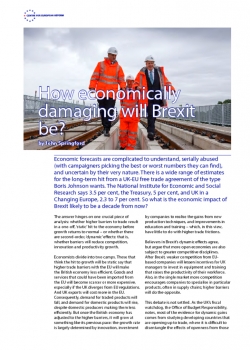
How economically damaging will Brexit be?
Forecasts of the long-term hit from Boris Johnson’s Brexit range from 2 to 7 per cent. There are several reasons to fear that that the costs will be on the higher side.
Economic forecasts are complicated to understand, serially abused (with campaigners picking the best or worst numbers they can find), and uncertain by their very nature. There is a wide range of estimates for the long-term hit from a UK-EU free trade agreement of the type Boris Johnson wants. The National Institute for Economic and Social Research says 3.5 per cent, the Treasury, 5 per cent, and UK in a Changing Europe, 2.3 to 7 per cent. So what is the economic impact of Brexit likely to be a decade from now?
The answer hinges on one crucial piece of analysis: whether higher barriers to trade result in a one-off, ‘static’ hit to the economy before growth returns to normal – or whether there are second-order, ‘dynamic’ effects: that is, whether barriers will reduce competition, innovation and productivity growth.
Economists divide into two camps. Those that think the hit to growth will be static say that higher trade barriers with the EU will make the British economy less efficient. Goods and services that could have been imported from the EU will become scarcer or more expensive, especially if the UK diverges from EU regulations. And UK exports will cost more in the EU. Consequently, demand for traded products will fall, and demand for domestic products will rise, despite domestic producers making them less efficiently. But once the British economy has adjusted to the higher barriers, it will grow at something like its previous pace: the growth rate is largely determined by innovation, investment by companies to realise the gains from new production techniques, and improvements in education and training – which, in this view, have little to do with higher trade frictions.
Believers in Brexit’s dynamic effects agree, but argue that more open economies are also subject to greater competitive disciplines. After Brexit, weaker competition from EU-based companies will lessen incentives for UK managers to invest in equipment and training that raises the productivity of their workforce. Also, in the single market more competition encourages companies to specialise in particular products, often in supply chains; higher barriers will do the opposite.
This debate is not settled. As the UK’s fiscal watchdog, the Office of Budget Responsibility, notes, most of the evidence for dynamic gains comes from studying developing countries that are opening up to trade, where it is difficult to disentangle the effects of openness from those of government policies, such as education spending, the degree of corruption or the effectiveness of the legal system, which will also affect incentives to innovate and invest. Still, there are several reasons to worry that the UK is vulnerable to dynamic losses from higher trade barriers, in some ways more than other advanced economies.
First, the UK has been exceptionally open to foreign direct investment (FDI) since the 1980s. Its car industry is largely foreign-owned, especially by Japanese and American companies that sought a foothold in the EU’s single market. American, Japanese, and European banks, accountancy and consulting firms have made big investments in operations in the City of London. And the UK is a favoured location for multinational corporations to conduct research and development in pharmaceuticals, biotechnology and software. Foreign-owned companies are responsible for over a quarter of UK output.
On average, foreign firms are larger, employ more workers, and are more productive than British-owned ones, in part because they are better managed. As the cost of trading with the EU will be significantly higher under an FTA than it is within the single market and customs union, some of these companies will wind down British operations, taking production facilities, investments in research and development, and managerial know-how elsewhere. And Britain will be a less attractive location for future FDI, curbing future productivity growth. Tesla’s decision to build its new plant near Berlin rather than in Britain is a case in point. There is no evidence to support Johnson’s claim that there will be a “tidal wave” of investment into the UK after Brexit.
Second, over the last two decades immigrants have improved the stock of skills of the British workforce, despite pro-Brexit campaigners’ obsession with low-skilled EU immigrants. Over 40 per cent of EU-27 nationals living in Britain have some form of higher education, compared to a quarter of UK citizens. And the UK attracts more highly-educated immigrants than France, Germany or Switzerland. Since the referendum, the big fall in net migration from the EU means that there are fewer skilled workers in the British labour market than if Remain had won. Furthermore, multinational companies transfer workers between their offices and factories in different countries: higher barriers to short-term work migration are inevitable if the UK leaves the single market, which will make it harder to attract staff or transfer workers to other European locations, discouraging some multinational corporations from investing in Britain.
Third, most studies of Britain’s entry into the then European Economic Community found sizeable gains, which are implausibly large for the static view. Using the same ‘synthetic control’ technique as I did to estimate the costs of Brexit so far, economists Nauro Campos and Fabrizio Coricelli found that ‘Brentry’ raised GDP per person by about 9 per cent. (The technique uses an algorithm to find the most similar economies to the UK, based upon prior economic performance, combines them into a doppelgänger UK that did not enter the EEC, and compares it to the actual UK data after the country joined.) More important, they found that entry led to larger gains in GDP per worker, suggesting that greater competition from EU importers and higher inward investment had a large and positive impact on productivity in Britain over time.
The last reason to fear dynamic losses is that even before Brexit has happened, its costs are already as large as the lower estimates for the long-term damage. The economy is now around 3 per cent smaller than it would have been, according to my estimate, and 2.5 per cent smaller when compared to pre-referendum forecasts, with a big shortfall in private sector investment. Free trade negotiations with the EU are likely to drag on for several years, and with the lingering threat of no deal, growth and investment are unlikely to bounce back, with worrying implications for the productivity of British businesses. Meanwhile, FTAs with distant countries will take a long time to negotiate, and cannot make up for higher trade barriers with the EU, Britain’s largest trade partner.
If Johnson wins the general election, he plans a free trade agreement with the EU that will result in “separate markets and distinct legal orders”, according to the political declaration on the future relationship. We cannot be certain, but there are good reasons to fear that Britain will be a significantly poorer country as a result. Fractious politics tends to accompany slow growth, as the last decade demonstrates. Strap in.
John Springford, deputy director of the Centre for European Reform



